You know what's up.
Crimewave

This is the only produced Coen brothers script that the brothers didn't direct themselves, though the duties were taken by their friend Sam Raimi. It combines elements of both of their careers in film, and combines them to create what might be best described as a live action Looney Tunes movie. The subject matter is darker, but the actual content of the film really isn't. When a man hires a couple of goons with silly voices to kill his business partner after finding out about his betrayal, they end up going on a rampage through the city, with one of the man's employees and a girl he meets getting caught up in it. It's a very strange and silly movie, with some very elaborate comedic setups, surprisingly exciting moments of action, and an entertaining appearance by Bruce Campbell. A bizarre film that you'll probably like if you're a fan of the filmmakers involved.
Dracula
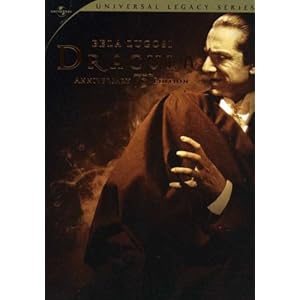
It's always interesting to me how sterile and stately the horror films of the 20s and 30s are. Genre icon Bela Lugosi stars in his signature role, instilling Dracula with charm and menace as he moves from Transylvania to London in order suck a lot of blood. It's of course pretty toothless in comparison to modern vampire stories, but I mostly enjoyed the slow discovery by the other characters of what Dracula really is and their calm attempts to prevent him from killing or enslaving any more women. Heh, toothless.
One from the Heart

Post-70s Francis Ford Coppola continues to make absolutely no sense to me. One from the Heart tells the story of a couple in Las Vegas that finds their relationship falling apart, and their struggles to either resolve their differences and move on with their lives. What makes the movie different is its musical quality - the characters don't really sing, but the original music by Tom Waits pervades the whole thing, it frequently dabbles in an unreal sense of space, and the film is entirely and totally obviously filmed on elaborate sets at a soundstage. The movie's budget problems and failure at the box office cost Coppola a ton of money, and a lot of his career from then on can be attributed to continued financial problems. Was it worth it? Uh, not really. The movie is okay.
Witness for the Prosecution

A courtroom drama directed by Billy Wilder, based on a play, based on a story by Agatha Christie. Other actors get higher billing, but the star of the show is definitely Charles Laughton, an aging English lawyer who was recently released from the hospital and decides to take on the defense of a man accused of murder, against his doctors' wishes. The trial itself is pretty straightforward, until the characters start making unexpected choices and Laughton has to stay on his feet to deal with the changes and continue the defense to his best ability. The ending is so twisty that a voice actually advises the audience to avoid spoiling it to their friends so they can enjoy it too. It's a well-made and wonderfully acted legal drama that wraps up satisfyingly without letting anything come too easily.
Sunday, January 29, 2012
Movie Update 37
Monday, January 16, 2012
Movie Update 36
These were expiring, so I watched them. Yep.
Ball of Fire

A screwball comedy directed by Howard Hawks, featuring Gary Cooper playing off type as an awkward, stuffy intellectual and Barbara Stanwyck playing very much on type as a club singer and mob boss' girlfriend who helps him and his fellow encyclopedia writers come out of their shells. Ball of Fire is mostly an enjoyable movie, though there's definitely something very weird about it. The professors are all pretty likable guys, but it's just a little uncomfortable seeing them all fawn over a young and attractive woman, even if it's innocent. The shift from her using them to avoid the police to actually getting romantically interested in Cooper is pretty abrupt as well. As I said though, it's mostly a fun movie.
Deathtrap

Sidney Lumet movies are often based on plays or feel like they could be, taking place in a small number of locations and not being particularly visually flashy. That's definitely the case with Deathtrap, though I think the entire thing being limited mostly to a single house works in its favor. Deathtrap was a play about writing a play based on a murder, and the fact that the movie version isn't a play itself does do a little to remove some of the inherent cleverness of the structure. But the story still works, and the performances by Michael Caine and Christopher Reeve are really good. I can't say as much about the other characters, but it's both an amusing and incredibly tense movie at times, with some great twists and surprises.
The Life and Death of Colonel Blimp

It was a big surprise for this movie to be in color, though apparently that was a thing for its makers Powell and Pressburger while most directors from the 40s were still working in black and white. The movie is based on British cartoons about a blowhard English military man, though it tells an original story about how such a man might come to be like that over a lifetime of fighting in wars. Roger Livesey and Anton Walbrook give a pair of great performances, first as young soldiers, then as middle aged veterans of the first World War, then as old relics at the beginning of the second. There's also an amusing bit with Deborah Kerr playing three different women who all look the same at various points in his life. The movie is concerned with many things, but the main one I thook away from it is how a lifetime of experiences can affect a person and make them who they are. A great and refreshingly civil war movie.
Odd Man Out

Carol Reed's The Third Man is a classic of the noir genre, though I can't say I enjoyed Odd Man Out nearly as much. It has an interesting subject, with James Mason playing an IRA leader who gets wounded and stranded in the middle of Belfast (though the film is not actually explicit about either of those references). There are some interesting moments sprinkled throughout, though I was mostly kind of bored while I was watching it, which shouldn't happen with a movie about hiding from the police and troublesome politics. I didn't think it was bad, I was just rarely actively intrigued by what was happening, and with a genre that thrives on intrigue, it was disappointing.
Sunday, October 30, 2011
Movie Update 27
Three movie posts in a row? What the hell is this?
Assault on Precinct 13
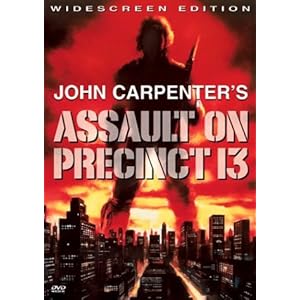
A pretty early John Carpenter film, which can be seen as a super violent action movie before super violent action movies were really a thing. It has elements of westerns and zombie movies, and tells the story of a few police officers and criminals defending a closed-down police station from a fraternity of gangs on the warpath. There are definitely bits of the movie I liked a lot, as it manages to build suspense and have some solidly exciting scenes despite a low budget. There are definite issues with the script though, which is a bit lean in some places and is filled with tough action dialogue that I could barely tolerate, especially for the lead good guy criminal. Stop being cute and act like a human being for five minutes, man.
Going My Way

A Best Picture winner starring Bing Crosby as a priest who comes to a new church and helps make it a nicer place, mostly by using his musical talent to keep it going and form a choir with its population of young boys. There's not really a lot of depth to the movie, but I found it mostly enjoyable. On occasion the musical numbers (it's not really a musical, but does have a lot of singing) seemed to go on a bit long, but in the end it's a nice tale of spirituality and kindness and whatever. I like Bing. Bing's a pretty cool dude.
Last Year at Marienbad
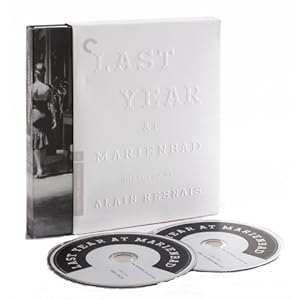
When people talk about incomprehensible foreign art films, this is basically exactly what they're talking about. Marienbad is a French movie about a man who tries to convince a woman that they had met and had an affair a year earlier at another place, and either he's making it all up or she just forgot somehow or she's deliberately pretending she doesn't know what he's talking about. The movie never really explains itself, and I don't think there really is a straight answer anywhere. It's not that the scenes don't follow or are made up of gibberish, it's just that it's really difficult to tell when things are taking place or where or what's real or if any of it is. I appreciated the great artistry that went into filming it, but I also can't say I really liked it. There's just no way to make heads or tails of it.
The Long Goodbye
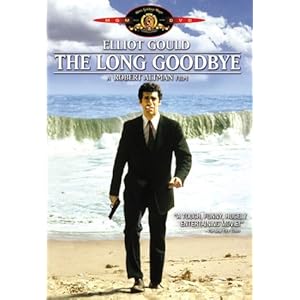
My favorite classic film noir might be The Big Sleep, starring Humphrey Bogart as Philip Marlowe. Robert Altman and Elliot Gould revived the character in the 70s with The Long Goodbye, moving him into that decade and highlighting the anachronism of a 40s hardboiled detective living in a then-modern LA. Some people don't like the way the movie plays with the genre or the deviations from the original novel, but I thought it was a mostly entertaining movie. It's also funny to see a very early appearance by Arnold Schwarzenegger as a thug who doesn't have any lines. Not a traditional detective story, but I think it's an interesting one.
The Phantom of the Opera
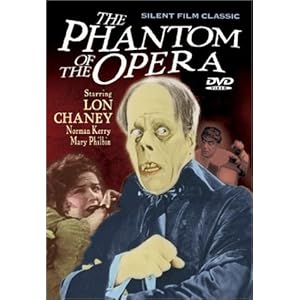
You know, I always got the impression that the Phantom was supposed to be a sympathetic figure, like his horrible visage masked a kindness and he was only secretive because of a life of torment, or something like that. But he really isn't. He kidnaps a woman and basically tells her he'll kill everyone if she goes back to her boyfriend instead of staying with him. Not cool, dude. This version of the story from the 20s is probably the best known film version, and it's pretty watchable, though not terribly exciting now. Lon Chaney's makeup is pretty good, but there's not much about the movie that's really scary. Not much of the good imagery from other silent horror classics. Still, probably worth checking out.
The Private Life of Sherlock Holmes

I guess there's some disappointment that when Billy Wilder makes a Sherlock Holmes movie that begins by teasing that its story will be surprising and possibly controversial, and the ends up just being a pretty normal Sherlock Holmes movie. In fact, the entire opening sequence where he lies about his sexuality to get out of a jam and which is the only thing that's truly original about the story, ends up being kind of a waste of time as it only barely plays into the rest of the film. It's not a big deal though, because it's a well paced, interesting mystery for Holmes and Watson to solve, with plenty of clues that seem odd at first but end up coming together to make a strange sort of sense. No Moriarty here, but we do have Christopher Lee as Mycroft, which is pretty delightful. Not an outstanding movie but a fun one. Not sure about the new Guy Ritchie sequel, though. Is it just me, or are none of the jokes in the previews actually funny?
Rome, Open City
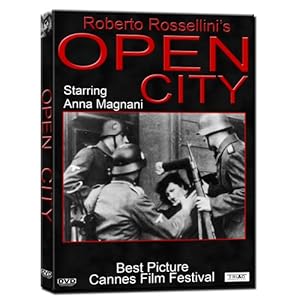
Italian neorealism! Catch the fever! Open City is remarkable for its depiction of the late Nazi occupation in Italy only months after the war actually ended, and for how unflinching it is in depicting the period. They didn't experience some of the worst horrors of the war, but it sure wasn't fun to resist the Third Reich at any point during their reign. The film suffers a bit from Italians Yelling a Lot Syndrome, but it's a well crafted piece of historical fiction, and I'm still impressed by it following so soon after the actual events it tries to reflect. A solid way to help kick off an important film movement.
Thursday, June 23, 2011
Movie Update 8
I watched half of these in a single day when they were about to expire from Netflix streaming. That was pretty wacky.
L'Avventura

Although I didn't particularly enjoy watching it, this was a pretty interesting film. The focus on the actual composition of the images a lot of the time seems unusual for the period, and the way the plot changes away from what you'd expect it to do over time does as well. A woman goes missing during a get together, and her fiancee and friend grow close as they look for her. Monica Vitti is certainly a beautiful woman, and she manages to keep the movie from getting boring mostly by herself. Apparently Italy can do low-key stuff after all.
Cleo from 5 to 7

It starts out pretty great with an overhead color shot of a tarot reading, but I thought the rest of it didn't quite live up to that inventive beginning. Still, a pretty good movie despite the lack of real action. Cleo is a singer who is afraid that upcoming test results will show she has cancer, and the film follows about an hour and a half of her life in real time as she meets with a few people and deals with the possibilities of the future. Very simple, but mostly watchable nonetheless.
Jules and Jim

A French film about a friendship between a man from France and one from Germany, which is disrupted and poisoned over many years by a woman who enters their lives and turns out to be a pretty significant nutcase. It's amazing how generally enjoyable the movie is to watch despite the amazing amount of dysfunction that's put on screen. It's almost hard to believe that the book it's based on was at least somewhat autobiographical. But still, a well acted, interesting film. Francois Truffaut plays around with a lot of different techniques, and his use of things like freeze framing is pretty innovative. The kind of movie that makes you glad foreign cinema exists, because I have trouble imagining it getting made here.
The Kid

The first full length film directed by Charlie Chaplin is a pretty enjoyable one, though I don't think it had the skill of some of his later work, and there just aren't a ton of comedic set pieces of much note. The tramp finds an abandoned baby in an alley, and instead of doing the proper thing, he ends up trying to raise it himself. Years later he uses the kid as an accomplice to commit crimes for petty cash, and forces him to fight another child. Later when the proper authorities try to return the child to its mother, he kidnaps him and tries to keep him from his biological family. I know it's a comedy and there's a very sweet, loving relationship between the tramp and the kid, but hey, that's what happens in the movie.
King Kong

The original film, which it turns out Peter Jackson was quite faithful to. After seeing that this seems like kind of a student project summarizing a bigger story, but it is pretty noteworthy for the effects, which must have been pretty impressive in 1933, because I haven't seen much from a long period after that that looks significantly better. The combination of stop motion and compositing has a lot of obvious flaws today, but still manages to sell the dangerous adventure everyone goes on pretty well. There are some aspects of the movie that it could do without, like casual sexism and racism, but it's pretty darn watchable for when it was made. And the ending really is pretty affecting, even if Jack Black managed to deliver the final line better than the first guy.
Love in the Afternoon

The first film from Billy Wilder I didn't truly like. I mean, it's not bad at all, and it's remarkably successful for what it is. The problem is that it's a romantic comedy that's not very funny or romantic. When it goes for laughs it usually works, but the film is mostly preoccupied with the central relationship between Audrey Hepburn (who I can confirm is gorgeous but probably as responsible as anyone for the trend towards ultra-skinny women) and Gary Cooper. The problem is I don't know why I should be rooting for them. Cooper seems like a fine actor, but he's too old here for me to understand why she's attracted to him, and his personality doesn't help at all, with him being an aloof womanizer for the vast majority of the picture. Just kind of a weird movie.
Pickpocket

Not quite as good as A Man Escaped, but Robert Bresson shows a lot of the same skill at creating a ton of tension and excitement out of very quiet protagonists performing perilous yet otherwise simple tasks. Several of these movies were kind of existential, and this definitely fits that. There's a certain dryness to the movie, but it lends it an air of realism that works well with the simple plot. A very well put together film, with a few lasting images throughout.
Rebecca

This is pretty easily the earliest Alfred Hitchcock movie I've seen, and for some reason my expectations weren't that high. In some ways, it's very much a product of its time. But I ended up loving it about as much as my other favorite Hitchcock films. The story takes a while but eventually goes to some pretty unexpected and shocking places, Judith Anderson is totally creepy, and George Sanders is as always amazingly slimy. Really good stuff.
Saturday, February 19, 2011
Some Like It Hot

After seeing just a couple minutes of Marilyn Monroe in All About Eve, I was pretty interested in seeing Some Like It Hot even if it wasn't any good. Of course it's a Billy Wilder movie so it was good anyway, and it also stars Jack Lemmon and Tony Curtis, two solid comic actors of the era who play off each other really well. Some Like It Hot is a cross-dressing movie, which is an idea that usually spells disaster in the modern film world but works well here, as two musicians witness a mob execution in Chicago and then go on the run as women so they can join an all-girl band and get a free trip to Florida. On the way though they both become attached to Monroe's Sugar, the band's singer who has problems with drinking and throwing herself at men. There are some wacky scenarios and a bit of competition between the two friends, but Lemmon's Jerry sort of falls in the running when all his attentions turn toward the overly forward and notably wealthy Osgood, who takes a liking to him.
So while he's stringing Osgood along since he likes being treated nicely, Curtis' Joe balances multiple personas as he plays a woman in the band and a wealthy heir to try to seduce Sugar. Of course he develops deeper feelings for her, and things get even messier when the mob shows up in their hotel for a party and figures out what's going on. It's all pretty over the top, but it works because it's just witty and likable enough to skirt over issues like the unbelievability of Sugar not noticing Josephine and Junior are the same person and the likelihood of the bad guys just happening to show up right where the heroes are. Really, the whole organized crime subplot could have totally flopped, but it ends up working both as a way to set up the extraordinary circumstances that force the cross-dressing in the first place and because of the goofy bad-guy banter that happens whenever they show up. It's a funny madcap adventure, with a bit of heart as well in all the right places. Monroe looks stunning through the whole movie, and of course the final line is an undeniable classic. Not my favorite Billy Wilder movie, but certainly a very good one.
Friday, November 12, 2010
The Apartment
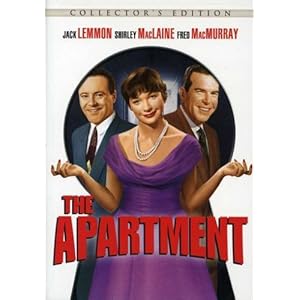
Another great film by Billy Wilder. I've seen that he can do film noir before, but now I know he can do romantic comedy. And those old romantic comedies that are actually funny and touching, not those modern ones that are all exactly the same familiar crap. The premise is something that could have come from a sitcom, but it's saved from those mundane origins by an extremely tight script that wrestles every possible ounce out of it and a fantastic cast. A few moments were sort of contrived, specifically how perfectly consistently everything the neighbors saw pointed to the same conclusion, but otherwise it was quite clever throughout.
It begins with a bit of narration by Jack Lemmon establishing his position in society at the outset. He works at an insurance company in New York City, and while he's an efficient worker, he doesn't get a lot of attention while on the job. He does however have a few executives on his side, because a situation has developed where he allows them to bring girlfriends and mistresses to his apartment near the park when he's not around, in return for a good word when promotion time comes. It's not a situation he's happy with, but he's accepted it, until he finds out that the reason the boss played by Fred MacMurray wants to use the apartment is he's having an affair with the elevator girl played by Shirley MacLaine that he's been getting to know.
Things proceed from there as everyone works with the knowledge they have, which might not be the complete picture. It's both funny and emotional when it wants as you feel affection for Lemmon and MacLaine as they get to know each other while events conspire against them, and MacMurray plays one of the more nuanced and interesting antagonistic characters from this kind of movie. What's interesting is the film's perceived dirtiness fifty years ago versus today. At the time it was controversial for its depiction of things like adultery, but it's almost impossibly innocent today, without so much as a single kiss taking place on screen (at least not that I can remember). It strikes the right balance between humor and drama, and is simply one of the best films I've seen from the 60s.
Wednesday, October 6, 2010
Sunset Boulevard

Billy Wilder can definitely shoot film noir. Double Indemnity is one of my favorites of the genre, and Sunset Boulevard was quite good too, especially for it's slightly different take on it. It's not about a hardened, streetwise detective solving a murder or something, it's just a down on his luck Hollywood writer who gets involved with an aging silent movie star trying to make a comeback in the world of talkies. As far as movies about the film industry itself go, it was one of the least annoyingly self massaging, although part of that might be I wasn't that familiar with the real people who made cameos (and Buster Keaton was too aged for me to recognize him on screen). But most of it is that it doesn't really sugarcoat Hollywood, in fact it makes some aspects of it seem pretty dire. Talented writers are forced to write schlock to get some money, and the second the public doesn't want you anymore you're pretty much done. It's a surprisingly effective backdrop for a story that begins with a body being discovered in a pool and then flashes back to show how we get there.
The movie mostly hinges on the performances of William Holden and Gloria Swanson. The former brings both a smarminess and a likability to the writer protagonist, and generally nails the noir narration, and the latter does very well as the aging actress, a role that was probably very close to home for her. A unique relationship develops between them as she basically forces him to become her companion with the promise that she'll pay him handsomely if he fixes up the screenplay for her comeback. Unfortunately for her ego, he ends up getting close to a younger woman while trying to get away from the mansion once in a while, and along with what's happening in her career, she becomes pretty mentally warped, heading towards an obvious breakdown. The ending is one of the most famous in cinema, and played brilliantly when it could have easily gone wrong. Just the right amount of creepy insanity. It was pretty much the last good thing Swanson did, but it was a hell of a way to go out.
Wednesday, May 2, 2007
Double Indemnity

Another movie from class. Double Indemity is a straight-up noir about an insurance salesman who gets involved with a murderous woman, and it's a perfect encapsulation of the genre. Darkly lit and stylistically filmed, it's entertaining to look at and listen to. The solid cast properly delivers the dialog, which is filled with a good blend of cleverness, humor, and noir's often silly over-seriousness and attempts at poetry. The plot seems slightly unbelievable as it gets going, but it recovers when later events shed new light on what happened. It's really interesting to watch them build up the plan and then pick it apart with a scalpel later on, really smart writing.
Double Indemnity excels at building up tension. The murder is only the first part of the story, the criminals have to deal with the aftermath and try to make it without getting caught. It's actually more interesting than the crime itself, watching the protagonist slowly get more and more desperate as he tries to escape his mistakes. It's a very interesting character, he's done something very wrong, but he's still sympathetic in a way. The female lead is also interesting, as you learn more about her past and get more and more suspicious. The actual good guy isn't the lead, and it's cool to see the story from a different perspective. Wilder really knew what he was doing with the cast and script. A great movie and example of the genre.

































